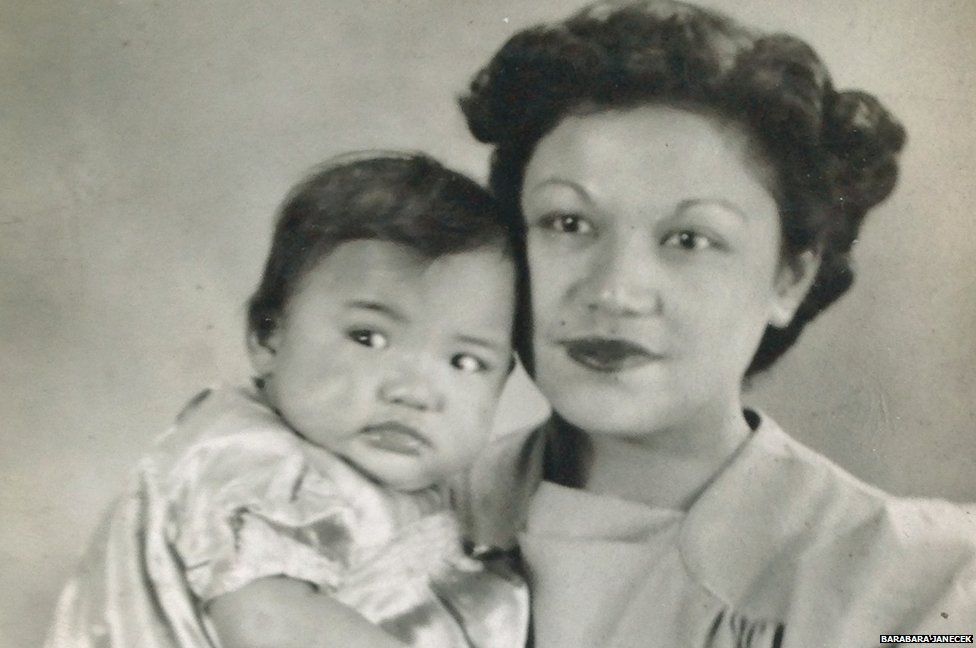The family who never knew their father
- Published

Our story about the forced repatriation of Chinese sailors who had been recruited for the Merchant Navy during World War Two told of the devastation for those families left behind. Barbara Janecek shared her own tale in response.
She had read about Yvonne Foley, whose father Nan Young, a Chinese ship engineer, was sent back to the Far East following the end of the war. He was one of thousands of recruits from Shanghai, Singapore and Hong Kong who lived in Liverpool.
"I was always waiting for my father to come back, I was always daydreaming he would," says Barbara, whose father John had suffered the same fate. John Ong had married Eileen Hing in 1943 when they were both aged 23. Eileen was devastated when her husband left, leaving his wife to raise three children under the age of four.
Her mother lived mostly on credit and it was a meagre existence. She would send her children to the corner shop to ask for broken biscuits and pieces off the end of the meat. Once her brother was asked to take a plate to school for the Christmas party and it broke while he made his way home. He burst into tears, realising the family would not have the means to replace it easily. Barbara survived tuberculosis, which she contracted aged two. Peter overcame rickets.
Eileen would spend her evenings working at the Golden Dragon restaurant in a bid to make ends meet. "At night we three children would sneak upstairs to visit old seaman Yau. Old Yau would share his watered down rice and cooked dried mandarin peel with three very hungry little children. What a feast that was."
She recalls the exotic animals which were brought into the basement of the "very dilapidated" Victorian house on Upper Stanhope Street in which they lived. "I remember one day I got home from school and there was a beautiful little turtle. It was orange and black. We were fascinated by this. I'm sure it must have died.
"One time we had a little monkey but it was very vicious so it didn't last very long in our house. He didn't bite us but he used to bite other people. When I look back it wasn't really an unhappy childhood."
Chinese sailors in Liverpool, WWII
- Liverpool was home to around 20,000 Chinese merchant seamen at the beginning of World War Two
- Many of these became casualties during this dangerous period, reducing the numbers significantly by the end of the war
- The two main shipping companies who employed them were Alfred Holt and Company and Anglo-Saxon Petroleum
Five or six years ago, the 70-year-old heard the story of her father's return to Liverpool, which she says "still makes me very sad".
"Supposedly my father came back to England for us," Barbara explains. But the family had already moved on. "I don't really know the situation or the circumstance but he knocked on either my mother's door or a neighbour's door and he asked about her.
"This woman said 'she's now married and she has another husband'."
It was understandable that with the passing of time, it would be assumed that John would never return. "My mother didn't know where my father had gone. She had waited seven years and never heard anything."
Barbara suggests the children may have been sent to London at that time and it wasn't until much later that they learned of this visit.
"That made me very sad to think he wanted us. My younger brother felt he had deserted us and felt so much animosity towards this young father."
"My mother didn't know she was pregnant when my father was sent away," Barbara adds. She later heard from an aunt that her mother had unsuccessfully tried to abort the child. "It was not an uncommon thing with women in those days."
Eileen had told her children very little about their father. The fact that he played the piano and violin and rode a motorcycle were a few of the only details they had to cling on to.
"I don't think about this very often but when I do it's very bittersweet," she adds. "How I wished I knew more."
Subscribe to the BBC News Magazine's email newsletter to get articles sent to your inbox.